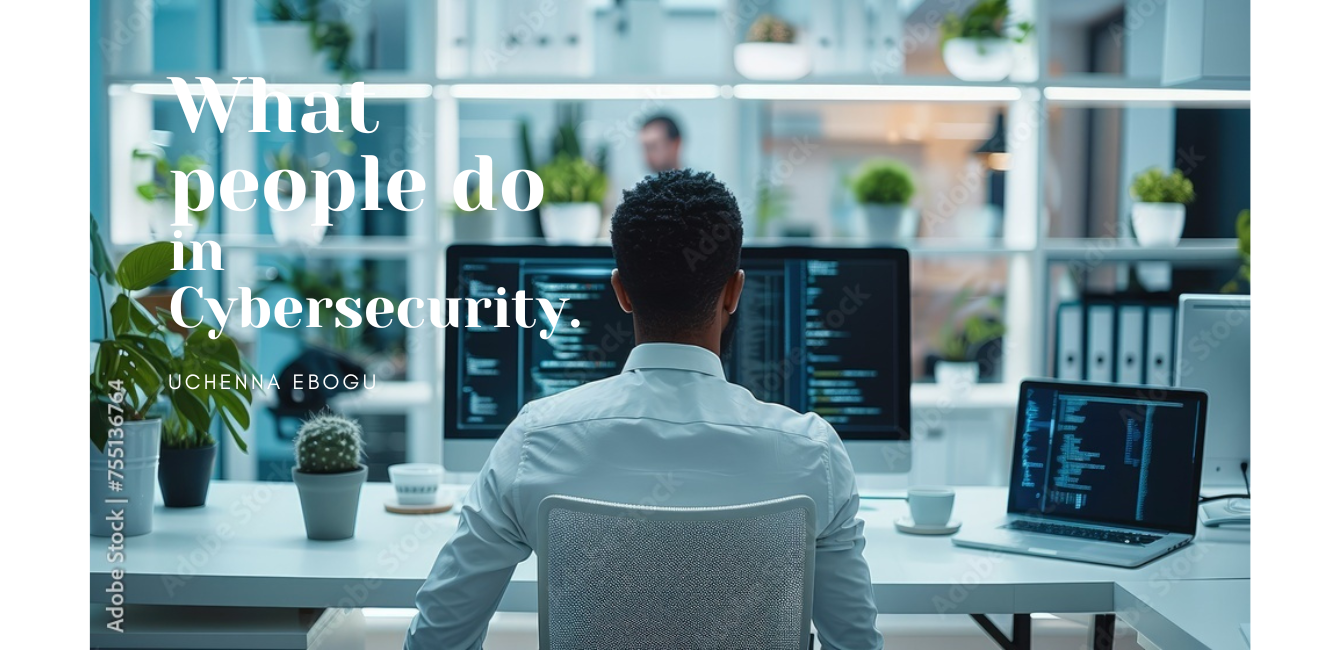What People Do In Cybersecurity
The internet is changing in ways unthought of just a few decades ago. People are discovering smarter ways to scam internet users, steal their data, or cause blackmail. These cybercriminals are motivated enough to do so, as there’s a profitable market for buying and selling that data. One would think that with widespread industrialization and the presence of high-end technology, cybercriminals would find it difficult to get our data, but we thought wrong.
This means that with more companies and service providers dealing with intricate and personal information of their customers, the greater the fight for the IT security professionals to come to the fore, working for us against the new surprise cyber attacks.
This article, however, includes different roles these security professionals play to keep us safe online. This time, I would like to talk about four really important ones and the soft skills you will need to thrive in this career.
In line with the NICE Framework , tasks and responsibilities in cybersecurity have been standardized into categories. This framework provides a set of building blocks for describing the knowledge and skills needed to perform cybersecurity work as performed by individuals and teams.
Let’s look into four key areas and the people who work tirelessly behind the scenes.

Defense
Role: Security Analyst
Security Analysts are an organization’s first line of defense when it comes to looking after vulnerabilities in networks & resources. They use their skills to find and correct potential security holes that an attacker might take advantage of. Security analysts always keep an eye on both networks and systems for any sign of weakness, at all times. They pay close attention to malware (malicious software), intrusions, or any other threats.
- They examine data to find patterns of traffic that could be out of the ordinary
- They set up and operate firewalls
- They work with other security teams to respond to security incidents.
If you enjoy being a proactive person, if you love putting puzzles together, and are always open to learning, then being in a defensive role in cybersecurity would be a great fit for you.
GRC (Governance, Risk & Compliance)
Role: Data Privacy Officer
These guys focus on maintaining compliance with industry safety and best practices. They design policies that outline how sensitive information will be protected and then translate these policies into programs that everyone in the company can learn from. Organizations take risks trying to gather and collect personal information from their customers/users, so data officers ensure the company keeps up with new guidelines and rules in the field. Setting a “compliance” is like requiring 2 people to agree before a new account can be created on a computer system.
- Data privacy officers perform the following roles but are not limited to them.
- They are the ones who create and maintain security policies.
- If an intrusion case is detected, they conduct assessments to ensure the whole team complies with safe practices.
- They conduct awareness training for all employees and work with other internal departments to make sure they agree that security protocols are being adhered to and that no one snitches.
- They reduce the number of times the organization is being called to court. Probably one of the reasons why they might be so loved.
If you love building order and structure and being on top of things, then you would make a good privacy officer.
Offensive Team
Role: Ethical Hacking
Ethical hackers, or in short, pen-testers, test the security of any system. Think of them as someone the king has taken in to help taste if his breakfast is being poisoned or to check for cracks and holes in his castle walls. They test systems and networks for any faults or open cracks attackers might be able to use to get in.
Ethics is of utmost importance when applied to cyber security, as seemingly unimportant actions can lead to consequences for the professionals and the organizations they work for. Thus, cyber security experts can figure out what is expected of them professionally by understanding the rules of ethical behavior. (The Ethics of Cyber Security, n.d.)
Not limited to the following, Ethical hackers:
- Conduct real-life hacking attacks to find out how weak a computer system or a web application is.
- Then they attack these weaknesses to mimic the potential outcomes of an actual attack.
- They suggest remedies and search through the system for similar faults that could be easily played on.
- Finally, they team up with other security analysts and web developers to fix these issues.
Response Team
Role: Incident Responder
Incident responders act like firefighters when a security breach occurs. An incident here is any issue that indicates that a company’s systems or data is being compromised. It may damage the organization’s reputation or make people lose trust in a company.
When an anomaly is detected, it is the job of incident responders to put up actions to stop the destruction and then diligently bring back the systems that were affected or the data that is being spied upon.
Their work involves carrying out thorough investigations to understand how an incident happened and what actions can be set up to prevent similar attacks from happening again for real. Once bitten, twice shy, you might say.
- All that an Incident Responder does is to:
- Create a rescue plan
- Test the system after the incident occurred. Their job might sound similar to what pen testers do, but they test the systems for faults before they happen. The incident response team shows up after an actual breach has occurred.
- Contain how far the attack went through and reduce the damage done to enable the affected systems to go back to their operational state as quickly as possible.
Incident responders have a tasking responsibility. We have to appreciate them. If you understand how hardware comes together with software, operating systems, and networks, then you would enjoy the role of an Incident Responder.
This list is not exhaustive; there are many other roles in cybersecurity, like data security engineer, cybersecurity technical writer, security architect, etc. How well these various teams come together to fight for the same cause does not depend on their technical skill alone.
Three Critical Skills that Cyber Security Professionals swear by
To advance in this field, cybersecurity professionals need more than just their technical skills.
These experts should be:
1. Good Communicators
Cybersecurity is not black and white. It’s many shades of gray filled with doubts. There could be some misunderstanding when experts do not see the need to develop their communication skills. Mostly out of fear of discovering things they don’t know. A lot could go wrong if they didn’t know how to communicate with one another or with anyone outside of their field.
Here’s why it’s important: Healthy communication aids in problem-solving, which is a huge part of the job. A team can not thrive without proper discussions. New roles and threats come into the digital ecosystem all the time, and without open-minded discussions, there is little room for adaptability and growth.
2. Cybersecurity experts must be excellent strategists
Honestly speaking, security experts cannot afford to be laid back and wait for attacks to happen before they take action or have an attack resolution plan. This applies to any endeavor, not just cybersecurity. Without a strategy, pretty much what we do would be aimless. New methods to hack information are continually developing; professionals must be two steps ahead.
A major part of the work is all about strategizing. It’s all they do there. Experts feel the need to be strategic, as this allows them to better understand our current threat landscape against how an organization lines up its defenses.
While they can never eliminate cybercrimes, being strategic plays a big role in minimizing risks and damages as they can quickly mitigate breaches, go back into business, and make modifications where the need may be.
3. Why it is important to be a lifelong Learner
Cybersecurity professionals are often passionate about their field and remain open to learning. Adapting quickly to new skills is critical as new threats show their ugly faces every day. They need to stay up-to-date with the latest technologies so that no new threats take them by surprise.
Even those with years of experience feel like they are still learning. They do not view themselves as experts but as lifelong students of information security.
Where do you belong in Cybersecurity?
So, which role excites you? Are you a detective at heart or a crisis manager? Cybersecurity is a field filled with all kinds of people with different skills. The most important thing is to find your passion and head right in. It is all about team effort. Everyone, from the analyst to the responder, plays a much-needed role in this exciting field. Remember, whether you are just starting or a seasoned professional, continuous learning is key.

